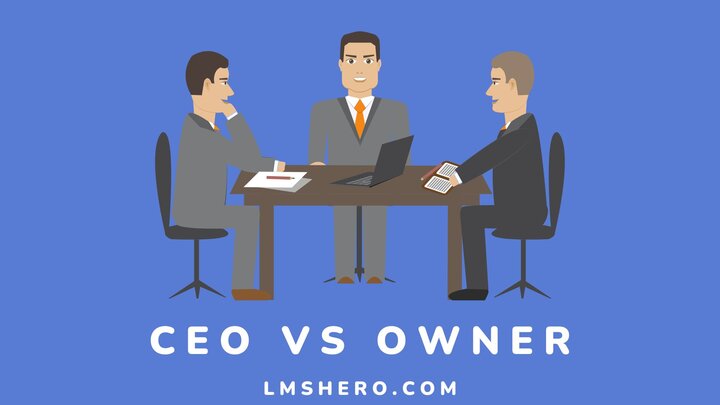Every business or company has someone who calls the shots. Such individuals are either the owner or the CEO (Chief Executive Officer) of the company. However, in small businesses, a person can be the owner and CEO.
While both titles hold great power, they are best suited to different situations. Let’s find out more.
What Does a CEO Stand For?

The “CEO” title is more suited to big firms with various departments. It means you are responsible for an enterprise’s success or failure (in terms of profit).
A CEO reports to the board of directors and can only be the highest authority in a company if the position is occupied by the owner of the business.
What Does It Mean to Be an Owner?
For owners, things can be a bit tricky. However, the title is mostly used for the head of a small business.
In cases where a small business scales and begins to have different factions, there is always a need to have a CEO. The owner of such a business can play this role or employ someone to handle things on his or her behalf.
Comparing CEOs and Owners
CEOs
CEOs only work in large firms and are responsible for overseeing the proper management of a company’s structure. They give periodic reports to the board of directors or shareholders who assigned them.
A company with a CEO will likely consist of other C-suite executives like CFO, and COO, just to name a few. The CEO delegates jobs to these executives and evaluates their reports to make management decisions.
For example, the CFO is usually an expert in managing finances in their hundreds and millions. Other C-level executives also manage crucial aspects of an organization.
This allows the CEO to focus more on implementing maintenance strategies only. A CEO also receives instructions and guidance regarding the company’s vision and goals from the board of directors.
In private firms, he or she may receive orders from the owner(s) of the company. He or she should also be prepared to answer questions when summoned by the board of directors or owner(s).
Owners
Business owners, most times, are in complete control of their customers and finance. They are sole proprietors and entrepreneurs who do not necessarily have to oversee management.
Those that insist on managing their business usually end up employing other hands as the business expands. This is to maintain the financial health of their business and focus on developing new strategies to boost revenue generation.
Marketing and accounting specialists are usually the first roles to be filled in this case. With more expansion and the creation of various departments, an owner may take on the CEO role. In this case, he or she will only answer to himself or herself.
Unlike the CEO, the salary of an owner does not just depend on how big the organization is. Other factors like percentage of ownership, expenses, and profit shares must be considered.
CEO Vs Owner: Key Differences at a Glance
| CEO | Owner |
| The CEO title can only be assigned to an individual by the board of directors, shareholders, or owners. | Entrepreneurs or sole proprietors are business owners capable of making themselves CEOs or assigning someone to the position. |
| CEO is a functional status that requires periodic reporting to the board of directors. It can be revoked at any time. | Business ownership is a legal status. It means you are officially in control of all the proceedings in your company. |
| You cannot be a part-time CEO because the position requires your full-time attention. | You can be a part-time owner or own the majority of the shares in your company alongside co-owners. |
| A CEO frequently represents a business during media interviews, writes welcome and motivational messages to team members, and gives speeches during conferences, among other duties. | An owner who is the CEO of his or her company has to be the face of the company and participate in conferences or media interviews. |
| CEOs receive monthly salaries and bonuses. The better the company performs, the higher the salary and bonus of a CEO. | Owners can decide whether to operate a salary-based system for their business. |
FAQs
What is the difference between a CEO and a chairman?
A CEO runs a company while a chairman evaluates the general performance of the company that a CEO manages.
The title chairman is often used to qualify the head of the board of directors to whom a CEO reports.
Do CEO and owner mean the same thing?
No, owner and CEO have different meanings. However, in small businesses, an owner can also be the CEO.
Conclusion
Being a CEO or Owner can be exciting and challenging at the same time. The exciting part involves making a positive influence on your employees, customers, and shareholders.
The challenging part often centers on the workload of these positions and ensuring it does not affect your personal life. If you are an owner whose business is rapidly expanding, I advise you to get more hands to assist you in managing operations.
CEOs usually have an array of C-level executives to communicate with. Make sure you practice more of a division of labor and your experience will be more pleasing.
I hope you find this article helpful. To learn more about how you can plan your schedule as a CEO or a busy employee, please see the various time management skills you must hone.
Thanks for reading.







